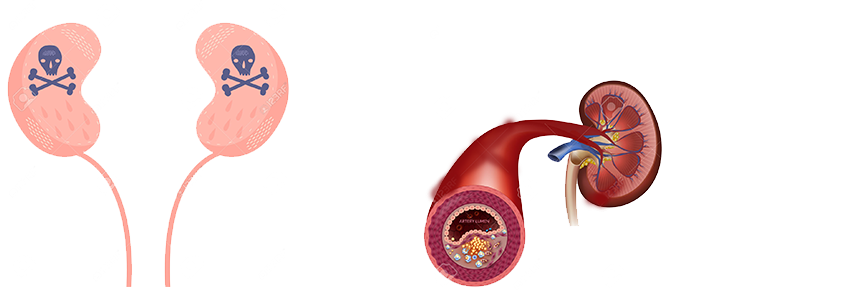Acute Kidney Failure

- loss of blood;
- severe dehydration;
- heart disease; or
- low blood pressure.
- infections such as, pneumonia or blood infection;
- inflammation of kidneys mainly after skin or heart infection;
- medicines such as, painkillers like aspirin, ibuprofen, drugs used in cancer treatments or antibiotics;
- toxins such as cocaine, heavy metals, lithium, propylene glycol ingestion;
- autoimmune diseases – lupus, vasculitis (autoimmune disease of vessels);
- blood clots in the veins and arteries of the kidney; or
- multiple myeloma.
- cancer of bladder, ureteral or pelvic organs;
- enlarged prostate;
- kidney stones; or
- blood clots in urinary tracts.
- Decrease in urine output;
- Fluid retention causing swelling of limbs;
- Nausea and vomiting;
- Difficulty breathing from fluid accumulation in the lungs.
- As the kidney failure progress:
- drowsiness and confusion;
- chest pain/ pressure/ heart attack;
- fatigue;
- seizure.
- Hospitalised with acute illness, specially critically ill patients in ICU;
- Advanced age;
- Diabetes mellitus;
- Peripheral vascular disease;
- High blood pressure;
- Heart failure;
- Blood tests:
- Glomerular filtration rate (GFR) measures the amount of blood that is filtered from the tiny filters in the kidneys over a period of time.
- Serum urea, creatinine.
- Level of sugar, salts, calcium, enzymes, etc.
- Counts of white blood cells, red blood cells and hemoglobin.
- Urine tests:
- Routine test of urine, protein in urine, blood in urine.
- Imaging:
- Abdominal X ray, ultrasound of kidneys, CT scan and/or MRI.
- ECG and Echocardiogram
- Biopsy – removing a piece of tissue from your kidney.
- Treatment of underlying cause causing kidney failure.
- Treatment of complication of kidney failure until kidney recovers by:
- keeping the balance of water by restricting fluid intake and giving diuretics to remove extra fluid;
- treating high potassium with medication; and
- supporting kidneys with hemodialysis until the kidney functions are restored.
Kidney failure means the kidneys become unable to filter the blood and remove waste and excess salt and water from body. Kidney failure can occur acutely over hours and days or develop gradually over a period. When kidney stops working abruptly, it is called acute kidney failure (injury) . When kidney function declines slowly over a period it is called chronic kidney disease (failure). Acute kidney failure develops mainly in very sick hospitalised patients.
If you are healthy and young, acute kidney failure can resolve completely by itself, or you may develop a chronic kidney disease. The risk of developing a chronic kidney disease goes up with age and presence of other chronic medical conditions. Eventually, the kidney stops to work completely and the patient needs dialysis to remove body waste products and maintain salt and water balance.
Causes
There are various causes of acute kidney failure. These include:
Decreased blood flow to the kidneys, which may be due to:
Damage to the kidneys, which may be due to:
Blockage to the normal pathway, due to:
Symptoms
There are no specific symptoms in early stage of the disease. However, when the disease progresses, the following symptoms could be seen:
Occasionally, acute kidney failure is identified in routine blood tests without you having any symptoms.
Risk factors
You have higher chances of having an acute kidney failure any of these conditions are true:
Diagnosis
Your doctor will conduct one or more of the following tests as required to determine if you have a kidney failure. Many of these tests assess the function of the kidneys, stage of disease, cause and complications:
Treatment
Treatment of acute kidney failure involves:
Prevention
Early diagnosis and good control of potential causes such as diabetes, hypertension and urinary tract obstruction is essential to prevent kidney failure. Review your medicines so that you are not taking medicines that put more strain on the kidneys. Be aware of over the counter medications especially painkillers. Change in health behavior and lifestyle (eating healthy, exercising regularly, avoiding smoking and alcohol, regular health check up etc.) so that you reduce your risk of developing cardiovascular diseases is also helpful in preventing kidney failure.



Send us your feedback on this article